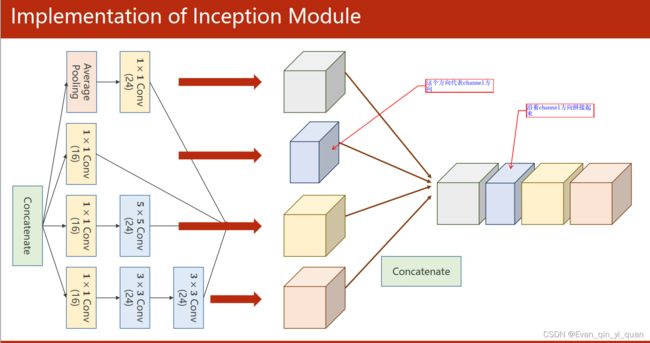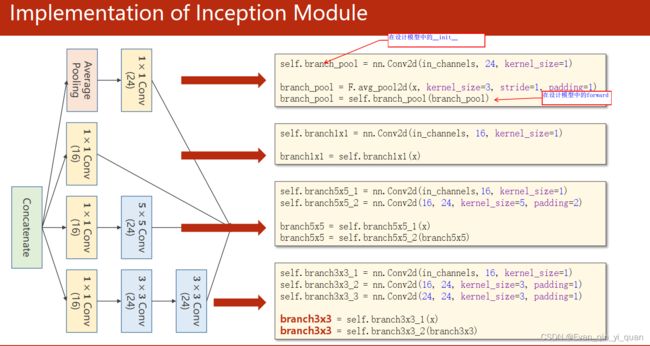Pytorch实战3——GoogLeNet对MNIST数据集分类
目录
一、GoogLeNet网络
二、编程实战对MNIST数据集分类
一、GoogLeNet网络
输入分为4个通道,每个通道分别做不同的运算,最后拼接起来
二、编程实战对MNIST数据集分类
代码基于上一篇的卷积神经网络编程,只需要把上一篇的代码中设计模型部分替换成维GoogLeNet网络的即可,其它部分代码不变,替换的模型如下
# GoogLeNet卷积神经网络模型
class InceptionA(nn.Module): #import torch.nn 就可以直接写(nn.Module)
def __init__(self, in_channels):
super(InceptionA, self).__init__()
self.branch1x1 = nn.Conv2d(in_channels, 16, kernel_size=1)
self.branch5x5_1 = nn.Conv2d(in_channels,16, kernel_size=1)
self.branch5x5_2 = nn.Conv2d(16, 24, kernel_size=5, padding=2)
self.branch3x3_1 = nn.Conv2d(in_channels, 16, kernel_size=1)
self.branch3x3_2 = nn.Conv2d(16, 24, kernel_size=3, padding=1)
self.branch3x3_3 = nn.Conv2d(24, 24, kernel_size=3, padding=1)
self.branch_pool = nn.Conv2d(in_channels, 24, kernel_size=1)
def forward(self, x):
branch1x1 = self.branch1x1(x)
branch5x5 = self.branch5x5_1(x)
branch5x5 = self.branch5x5_2(branch5x5)
branch3x3 = self.branch3x3_1(x)
branch3x3 = self.branch3x3_2(branch3x3)
branch3x3 = self.branch3x3_3(branch3x3)
branch_pool = F.avg_pool2d(x, kernel_size=3, stride=1, padding=1)
branch_pool = self.branch_pool(branch_pool)
outputs = [branch1x1, branch5x5, branch3x3, branch_pool] #
return torch.cat(outputs, dim=1) #输出维度 = 24+24+24+16=88,按channel方向拼接起来
class Net(nn.Module):
def __init__(self):
super(Net, self).__init__()
self.conv1 = nn.Conv2d(1, 10, kernel_size=5)
self.conv2 = nn.Conv2d(88, 20, kernel_size=5)
self.incep1 = InceptionA(in_channels=10)
self.incep2 = InceptionA(in_channels=20)
self.mp = nn.MaxPool2d(2)
self.fc = nn.Linear(1408, 10)
def forward(self, x): # (batchsize,channels,weight,high)
in_size = x.size(0)# x.size(0)指batchsize的值,
x = F.relu(self.mp(self.conv1(x))) # 1*28*28 -> 10*24*24 -> 10*12*12
x = self.incep1(x) # 输出88*12*12
x = F.relu(self.mp(self.conv2(x))) #88*12*12 - 20*8*8 -20*4*4
x = self.incep2(x) # 88*4*4 =1408
x = x.view(in_size, -1) #(x.size(0),-1)将tensor的结构转换为了(batchsize, channels*w*h),即将(channels,w,h)拉直
x = self.fc(x)
return x
model = Net()运行结果:
[1, 300] loss: 0.842
[1, 600] loss: 0.214
[1, 900] loss: 0.157
Accuracy on test set: 96 %
[2, 300] loss: 0.128
[2, 600] loss: 0.106
[2, 900] loss: 0.089
Accuracy on test set: 97 %由于我只训练了2轮,准确率未提升,多训练一些,会发现准确率提高到98%


